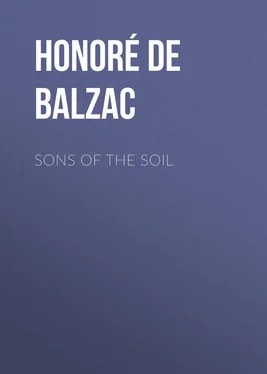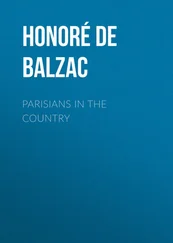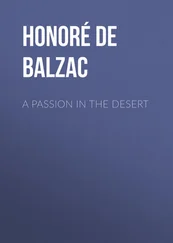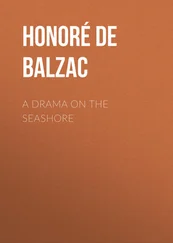Honoré Balzac - Sons of the Soil
Здесь есть возможность читать онлайн «Honoré Balzac - Sons of the Soil» — ознакомительный отрывок электронной книги совершенно бесплатно, а после прочтения отрывка купить полную версию. В некоторых случаях можно слушать аудио, скачать через торрент в формате fb2 и присутствует краткое содержание. Жанр: literature_19, foreign_antique, foreign_prose, на английском языке. Описание произведения, (предисловие) а так же отзывы посетителей доступны на портале библиотеки ЛибКат.
- Название:Sons of the Soil
- Автор:
- Жанр:
- Год:неизвестен
- ISBN:нет данных
- Рейтинг книги:5 / 5. Голосов: 1
-
Избранное:Добавить в избранное
- Отзывы:
-
Ваша оценка:
- 100
- 1
- 2
- 3
- 4
- 5
Sons of the Soil: краткое содержание, описание и аннотация
Предлагаем к чтению аннотацию, описание, краткое содержание или предисловие (зависит от того, что написал сам автор книги «Sons of the Soil»). Если вы не нашли необходимую информацию о книге — напишите в комментариях, мы постараемся отыскать её.
Sons of the Soil — читать онлайн ознакомительный отрывок
Ниже представлен текст книги, разбитый по страницам. Система сохранения места последней прочитанной страницы, позволяет с удобством читать онлайн бесплатно книгу «Sons of the Soil», без необходимости каждый раз заново искать на чём Вы остановились. Поставьте закладку, и сможете в любой момент перейти на страницу, на которой закончили чтение.
Интервал:
Закладка:
Honoré de Balzac
Sons of the Soil
DEDICATION
Jean-Jacques Rousseau wrote these words at the beginning of his Nouvelle Heloise: “I have seen the morals of my time and I publish these letters.” May I not say to you, in imitation of that great writer, “I have studied the march of my epoch and I publish this work”?
The object of this particular study – startling in its truth so long as society makes philanthropy a principle instead of regarding it as an accident – is to bring to sight the leading characters of a class too long unheeded by the pens of writers who seek novelty as their chief object. Perhaps this forgetfulness is only prudence in these days when the people are heirs of all the sycophants of royalty. We make criminals poetic, we commiserate the hangman, we have all but deified the proletary. Sects have risen, and cried by every pen, “Arise, working-men!” just as formerly they cried, “Arise!” to the “tiers etat.” None of these Erostrates, however, have dared to face the country solitudes and study the unceasing conspiracy of those whom we term weak against those others who fancy themselves strong, – that of the peasant against the proprietor. It is necessary to enlighten not only the legislator of to-day but him of to-morrow. In the midst of the present democratic ferment, into which so many of our writers blindly rush, it becomes an urgent duty to exhibit the peasant who renders Law inapplicable, and who has made the ownership of land to be a thing that is, and that is not.
You are now to behold that indefatigable mole, that rodent which undermines and disintegrates the soil, parcels it out and divides an acre into a hundred fragments, – ever spurred on to his banquet by the lower middle classes who make him at once their auxiliary and their prey. This essentially unsocial element, created by the Revolution, will some day absorb the middle classes, just as the middle classes have destroyed the nobility. Lifted above the law by its own insignificance, this Robespierre, with one head and twenty million arms, is at work perpetually; crouching in country districts, intrenched in municipal councils, under arms in the national guard of every canton in France, – one result of the year 1830, which failed to remember that Napoleon preferred the chances of defeat to the danger of arming the masses.
If during the last eight years I have again and again given up the writing of this book (the most important of those I have undertaken to write), and as often returned to it, it was, as you and other friends can well imagine, because my courage shrank from the many difficulties, the many essential details of a drama so doubly dreadful and so cruelly bloody. Among the reasons which render me now almost, it may be thought, foolhardy, I count the desire to finish a work long designed to be to you a proof of my deep and lasting gratitude for a friendship that has ever been among my greatest consolations in misfortune.
De Balzac.PART I
Whoso land hath, contention hath.
CHAPTER I. THE CHATEAU
Les Aigues, August 6, 1823.
To Monsieur Nathan,
My dear Nathan, – You, who provide the public with such delightful dreams through the magic of your imagination, are now to follow me while I make you dream a dream of truth. You shall then tell me whether the present century is likely to bequeath such dreams to the Nathans and the Blondets of the year 1923; you shall estimate the distance at which we now are from the days when the Florines of the eighteenth century found, on awaking, a chateau like Les Aigues in the terms of their bargain.
My dear fellow, if you receive this letter in the morning, let your mind travel, as you lie in bed, fifty leagues or thereabouts from Paris, along the great mail road which leads to the confines of Burgundy, and behold two small lodges built of red brick, joined, or separated, by a rail painted green. It was there that the diligence deposited your friend and correspondent.
On either side of this double pavilion grows a quick-set hedge, from which the brambles straggle like stray locks of hair. Here and there a tree shoots boldly up; flowers bloom on the slopes of the wayside ditch, bathing their feet in its green and sluggish water. The hedge at both ends meets and joins two strips of woodland, and the double meadow thus inclosed is doubtless the result of a clearing.
These dusty and deserted lodges give entrance to a magnificent avenue of centennial elms, whose umbrageous heads lean toward each other and form a long and most majestic arbor. The grass grows in this avenue, and only a few wheel-tracks can be seen along its double width of way. The great age of the trees, the breadth of the avenue, the venerable construction of the lodges, the brown tints of their stone courses, all bespeak an approach to some half-regal residence.
Before reaching this enclosure from the height of an eminence such as we Frenchmen rather conceitedly call a mountain, at the foot of which lies the village of Conches (the last post-house), I had seen the long valley of Aigues, at the farther end of which the mail road turns to follow a straight line into the little sub-prefecture of La Ville-aux-Fayes, over which, as you know, the nephew of our friend des Lupeaulx lords it. Tall forests lying on the horizon, along vast slopes which skirt a river, command this rich valley, which is framed in the far distance by the mountains of a lesser Switzerland, called the Morvan. These forests belong to Les Aigues, and to the Marquis de Ronquerolles and the Comte de Soulanges, whose castles and parks and villages, seen in the distance from these heights, give the scene a strong resemblance to the imaginary landscapes of Velvet Breughel.
If these details do not remind you of all the castles in the air you have desired to possess in France you are not worthy to receive the present narrative of an astounded Parisian. At last I have seen a landscape where art is blended with nature in such a way that neither of them spoils the other; the art is natural, and the nature artistic. I have found the oasis that you and I have dreamed of when reading novels, – nature luxuriant and adorned, rolling lines that are not confused, something wild withal, unkempt, mysterious, not common. Jump that green railing and come on!
When I tried to look up the avenue, which the sun never penetrates except when it rises or when it sets, striping the road like a zebra with its oblique rays, my view was obstructed by an outline of rising ground; after that is passed, the long avenue is obstructed by a copse, within which the roads meet at a cross-ways, in the centre of which stands a stone obelisk, for all the world like an eternal exclamation mark. From the crevices between the foundation stones of this erection, which is topped by a spiked ball (what an idea!), hang flowering plants, blue or yellow according to the season. Les Aigues must certainly have been built by a woman, or for a woman; no man would have had such dainty ideas; the architect no doubt had his cue.
Passing through the little wood placed there as sentinel, I came upon a charming declivity, at the foot of which foamed and gurgled a little brook, which I crossed on a culvert of mossy stones, superb in color, the prettiest of all the mosaics which time manufactures. The avenue continues by the brookside up a gentle rise. In the distance, the first tableau is now seen, – a mill and its dam, a causeway and trees, linen laid out to dry, the thatched cottage of the miller, his fishing-nets, and the tank where the fish are kept, – not to speak of the miller’s boy, who was already watching me. No matter where you are in the country, however solitary you may think yourself, you are certain to be the focus of the two eyes of a country bumpkin; a laborer rests on his hoe, a vine-dresser straightens his bent back, a little goat-girl, or shepherdess, or milkmaid climbs a willow to stare at you.
Читать дальшеИнтервал:
Закладка:
Похожие книги на «Sons of the Soil»
Представляем Вашему вниманию похожие книги на «Sons of the Soil» списком для выбора. Мы отобрали схожую по названию и смыслу литературу в надежде предоставить читателям больше вариантов отыскать новые, интересные, ещё непрочитанные произведения.
Обсуждение, отзывы о книге «Sons of the Soil» и просто собственные мнения читателей. Оставьте ваши комментарии, напишите, что Вы думаете о произведении, его смысле или главных героях. Укажите что конкретно понравилось, а что нет, и почему Вы так считаете.












